Continuing with Bryan Bignell's photographs...
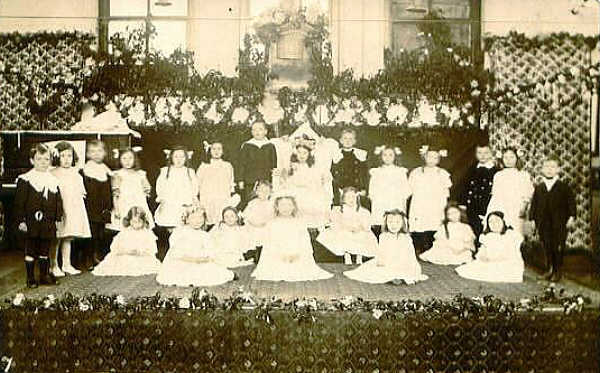
Class Display, Air Balloon Infants School about 1909
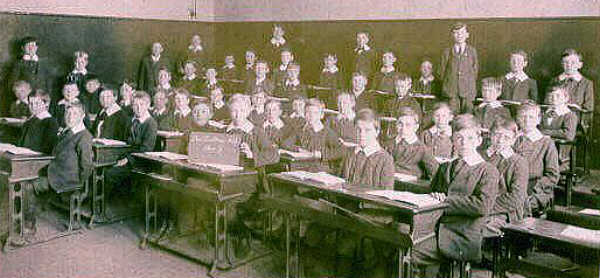
This is, Bryan believes, the Higher Grade School (as it was called) by St. Georges Park
Bryan's father is in the photo, and he finished his schooling there.
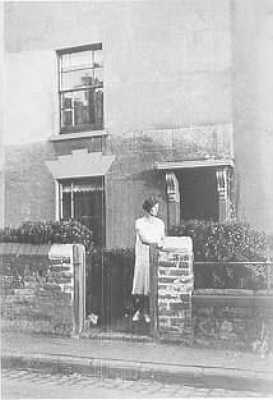
Bryan's mum
Bryan says that the address was 18 Two Mile Hill.
In the early 1930's the road was widened and chopped all the garden off.
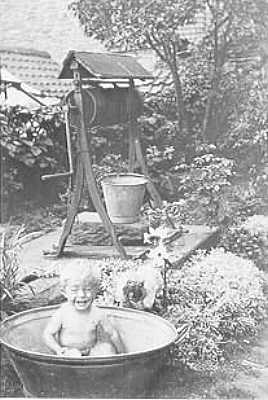
The Old Well
in the very large back garden behind the East Cheap Forage store, it was still being used at the time of the
photo which would be 1934. Its me having a bath in the bathtub
(no bathrooms where we lived).
The well it was over 80ft deep. When the Second World War started the local government installed a pump at the bottom of it which was connected by to steel wires to a rocking arm on the surface. It was available as an emergency supply if the mains were hit by a bomb. The interesting thing is because of the depth; when they installed it they had to wear special oxygen masks. Many is the time when I filled up buckets for grandma by working the arm. The water came out of a standpipe which ran up the side wall of the well. The property was subject to compulsory purchase by the council for the building of the old peoples flats that stand there today. When the old property was cleared with all the many outhouse and sheds which were in the long garden behind; much of what then was considered rubbish went down the well before it was filled in. So under the old peoples flats deep below ground is buried treasure, or antiques.
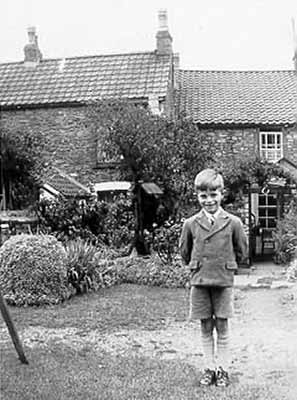
Bryan at the rear of his grandparent's shop
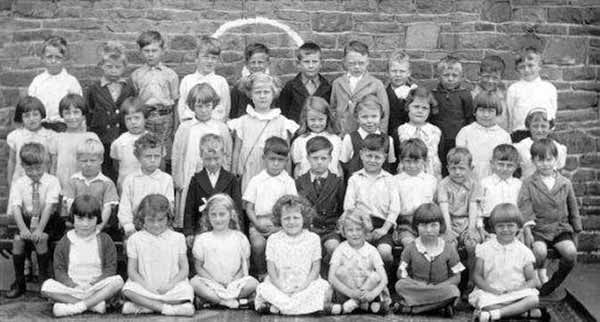
Air Balloon School
Bryan is in the back row on the extreme right
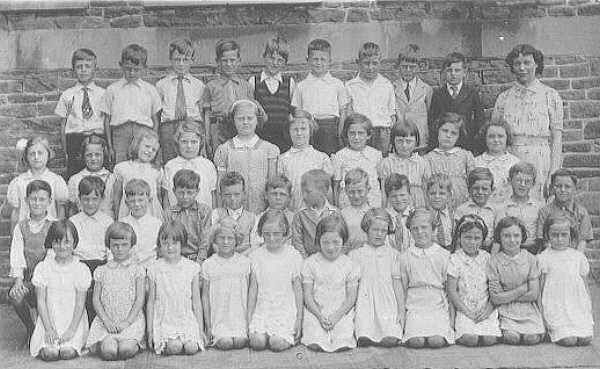
Air Balloon Infants in 1939
This is Miss Kelly's class and Bryan is in this photo
In April, 2010, Bryan wrote...
I was eight years old and can recall listening to the Prime Minister's broadcast telling the nation "we are now at war with Germany" and the very big headlines on the morning papers.
I am afraid that the majority of the kids found it all very exciting, a bit like a real life Cowboys and Indians film that we watched at the cinema matinees. The first real taste of a war experience happened on Sunday, 24th November 1940. I and my parents were in the chapel attending the evening service, the preacher had just started his sermon and it was about 6. 40pm when the sirens blew the air raid warning. Because my Dad was a Air Raid Warden and had to go on duty, we decided to make a dash for home, which was about half a mile away.
The chapel was in Kingswood one of the highest areas of Bristol so as we ran down the hill keeping close to any wall, you could see the view over the city and it was in a way very pretty, like a huge slow moving firework display as the German flares floated down. A bomb dropped quite close to the chapel we had left before we got home, and the noise was quite deafening. We got home safely and headed down the garden to our Anderson Shelter, just Mum and me as Dad was out on duty, and there we spent the night.
During the Blitz we spent most of the nights in the Air Raid Shelter at the bottom of our garden, it was small with four bunk beds and paraffin lamp and candles for emergency if the power station or electricity cables were hit by a bomb. It was not easy to sleep with the noise of guns and bombs, and so if the raid lasted all night I didn't go to school the next day. (or anyone else, I might add) The raid that I have just told you about was later described in the following official words...
The worst raid was on the night of Sunday, 24th November 1940. The raid started with pathfinder flares illuminating the city at 6.50pm. In a single night the city had changed forever. The Lord Mayor, Alderman Thomas Underwood, was to write in 1942, that that night "The City of Churches had in one night become the city of ruins". Much of the area around Wine and Castle Streets, in fact the whole of the area which is now Castle Green, was reduced to a mass of rubble. The damage wasn't confined to this area though, bombs fell on College Green, Park Street, Queen's Road, Redcliffe Street, Thomas Street and Victoria Street.
Air Balloon Infants school which I was attending when the war started was also used as the headquarters of the Local group of Air Raid Wardens and Dad was one of them. The school was being used so much of the time by the air raid wardens that we were moved to Summer hill School which utilized local church rooms to cope with the influx of all the pupils from Air Balloon Infants. I did not like the school and on more than one occasion received the cane not that I think it did me any harm, because I probably deserved it.
But the one occasion when I did not deserve it, turned out to be the most humiliating and the most painful. During the war with teacher shortages, air raids etc,, the schools used a prefect system where a pupil was made a prefect, and was supposed to keep order in the classroom while the teacher was absent. The prefect for my class did not like me and on the slightest excuse reported me to the head teacher. The following morning assembly I was caned on the hands with a thick cane by Mr Hancock, head of the school, who was not a very nice man; but I had done nothing to deserve it.
However while I was there the Blitz was at its height and there were raids all the time; I have reason to remember two of them in particular because they were directed on the aircraft works at Filton where my father worked.
One of the main targets for the bombers were airfields and Aircraft manufacturing plants of which Bristol had one of the largest at Filton, and my father worked there as foreman in the Tool room. He also was one of the companies team of Air Raid wardens whose job it was to patrol the site during air raids, to put out Incendiary (fire bombs) before they could set buildings alight. The rest of his mates from the tool room went to two air raid shelters allotted to that department, half the men in each shelter.
The air raid in question was on Monday 25th September 1940 it was not a big one by German standards, unusual inasmuch as it was in the middle of the day, not at night as we were used to. The raid was so much of a surpise our defences were caught of guard, the actual raid lasted only a few minutes and then the german planes were gone with few casualties to themslves. It was totally directed at Filton and there was much damage. Although he was outside, and not in the shelter my father was unhurt physically. When he returned home much later than usual, he broke down in tears and wept for quite a while.... one of the shelters in which half of the men in the tool room were situated received a direct hit from a German bomb and everyone was killed. He was late home because he had been recovering the bodies of his friends from the debris...it was the only time I ever saw my father weep.
I was attending school at Summer hill on the day in question, because the raid was in the afternoon we had to go the school air raid shelter. Our teacher was one of the school wardens and was outside on patrol with his steel helmet on, which was lucky for him because he was hit on the head by a piece of Shrapnel (bits of exploded anti-aircraft shells). I and several of my mates did see some of the air fights between our fighters and the Germans, as the view of the sky over Filton was good from Summer Hill.
My mother had gone down to town to do some shopping and was in Jones department store when the raid started. She, like everyone else had to go to the shelter, and while she was there someone said she had heard that the works at Filton were being heavily bombed. Mum always said afterwards that it was probably one of the worst moments of her life, and she prayed that dad would not be harmed.
Another thing which happened in the early part of the war was the frantic building of defenses against the Germans when they invaded the country, which was very much expected by everyone just after our depleted army returned from Dunkirk. The army built a heavy defensive wall on both sides of the road by the Rodney Pub some 50 yards up the road from our home. Within the wall there were slits for the guns to poke through and on top were concrete pillboxes.
Where the wall ended on the side of the road (each side) they dug deep holes in the road all the way across between the ends of the walls. Each Hole was big enough to take a 10ft Steel Girder which when it was in place stood about 6 ft above the ground. This was to stop German tanks from going up or down the road, and when the Home Guard was formed they use to have regular practice sessions to see how quickly they could get all the girders in the holes, and be in position ready for the enemy. Normally the girders were stacked by the wall so the traffic could move as normal.
You can imagine what fun the gang had playing soldiers in between times. However for us kids there was never a dull moment as we listened to the news and moved the flags on our war maps, which were on every child's bedroom wall. Picking up shrapnel (bits of bomb casing), and bullet and shell cases on the way to school after the air raids was fun, many cannon shell cases were polished up and used as brass ornaments on the fireplace.
Despite the lack of luxuries such as chocolate and bananas and oranges and the meagre food rations, everyone had the war spirit in them and were determined not to give in. We all went on living our lives as well as we could, because in a war situation you do get used to things like air raids and bombs. This was most apparent by the fact that when the first raids happened everyone rushed to the nearest air raid shelter, whereas after a few weeks no one did, unless the german aircraft were directly overhead.
This is easily illustrated by the following bit of the story. My father took us for a break from the constant air raids down to Devon for a couple of days. They had not had any air raids in Paignton where we went, but on the first night we were there the air raid siren sounded and everyone rushed to the nearest shelter, but we stayed in bed. Bathing in the sea was allowed for one hour twice a day, and at the appointed time the army came and removed a small section of the Barbed wire so people could access the beach. The reason for this was; in the early part of the war just after Dunkirk when Great Britain was very weakened by the loss of men and equipment in Europe, there was the imminent danger of an invasion by the Germans. One of the things that was put in place was Barbed wire defences all along the southern coast. Most of these were in a permanent position, but where there was a town or village at least one small part of the wire was removable, to give access to the beach. So in spite of the privations of wartime and the fact that my parents were poor by today's standards, I had a very happy childhood.
Bryan also wrote an article for the BBC WW2 People's War series.
* Many historic buildings were lost forever during this raid, the worst that Bristol suffered. St. Peter's Hospital, the Dutch House, the city museum, the art gallery, much of the university, Prince's Theatre, Upper Arcade, three Norman churches, seven newer churches, eight schools, and many alms-houses, cinemas and factories all disappeared, along with 10,000 houses.
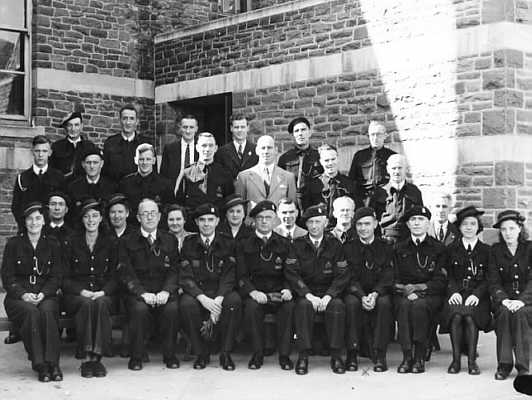
Air Raid Wardens based at Air Balloon School during WWII
The senior officer, sat centre front, is Doctor Baldwin the head of St. George Grammar school,
The man standing on the very back row centre is Mr. Luker, the greengrocer from near Marling road.
Bryan's dad is sat on the doctors' left next to the sergeant.
Geoff Tennant emailed me in August 2019, with more information about the above photo. Geoff wrote that "The woman in the front row, picture 1st left, is my late Godmother, Eileen Cole, of Tetbury Rd. Sat next to Eileen in the front row, picture 2nd from left, is my late Mother then Kath Justin of Hillside Rd and later to be Kath Tennant when she married my father, Doug Tennant, also of Hillside Rd. Eileen and my Mother were lifelong best friends."

Air Raid Wardens based at Air Balloon School during WWII
Bryan's dad is 3rd from the right in the second row up
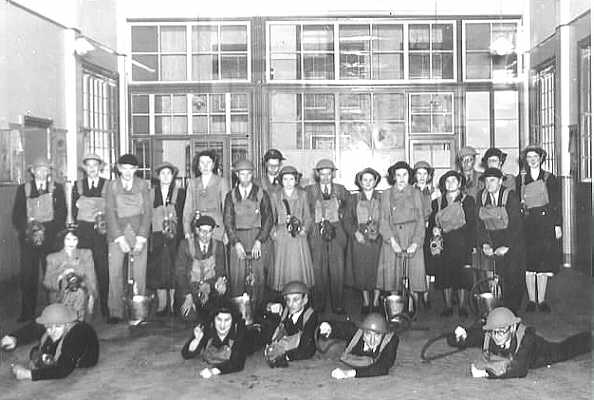
The Air Raid Warden practice Fire Drill
Note that everyone has their gas masks
This page created February 12, 2005; last modified January 25, 2022









